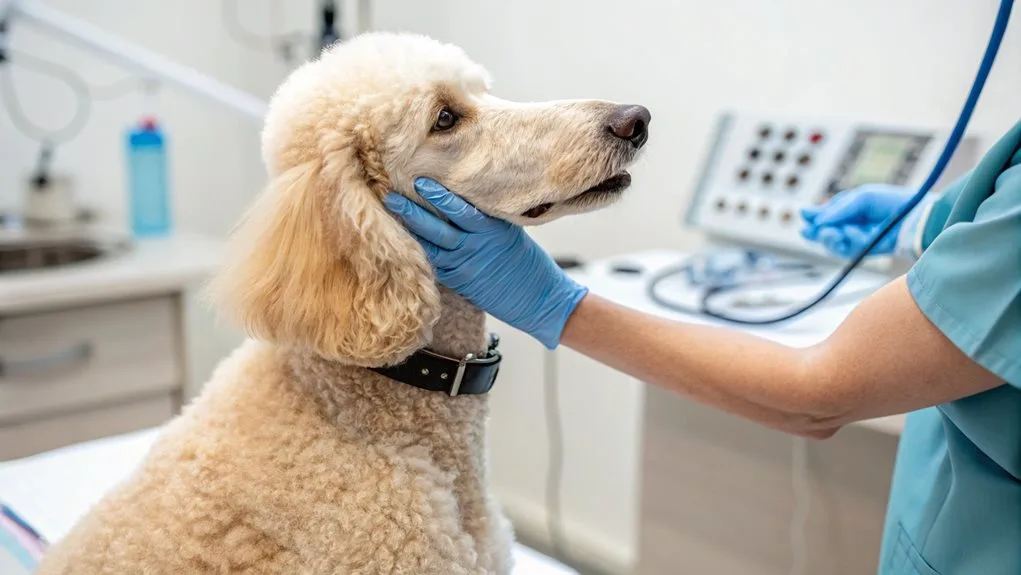Thyroid Health in Poodles: Common Problems Explained

Thyroid problems are common in Poodles, especially Standard Poodles, due to their genetic makeup. The most frequent issue is hypothyroidism, where the thyroid gland doesn’t produce enough hormones to regulate metabolism properly.
Watch for signs like unexplained weight gain, lethargy, and changes in coat quality – including thinning fur or excessive shedding. Regular vet check-ups with blood tests can catch thyroid issues early, making them easier to manage with daily medication and lifestyle adjustments.
A balanced diet, proper exercise, and stress reduction all play important roles in thyroid health. Understanding your Poodle’s unique needs is just the beginning of maintaining their thyroid wellness.
Key Takeaways
- Poodles, particularly Standard Poodles, have a genetic predisposition to thyroid disorders, with hypothyroidism being the most common condition.
- Common symptoms include weight gain, dull coat with hair loss, lethargy, cold intolerance, and behavioral changes like anxiety or depression.
- Diagnosis requires blood tests measuring thyroid hormone levels (T3 and T4), with regular monitoring essential for proper treatment.
- Treatment typically involves daily hormone replacement therapy (levothyroxine), with dosage based on the dog’s weight and symptom severity.
- Prevention strategies include regular veterinary checkups, genetic screening before breeding, and maintaining detailed health records to track symptoms.
Understanding the Poodle Thyroid

The thyroid gland plays a vital role in regulating a Poodle’s metabolism, growth, and overall development. Located in the neck area, this butterfly-shaped gland produces hormones that control how quickly your Poodle’s body uses energy, making it essential for maintaining healthy body temperature and weight.
Understanding thyroid anatomy in Poodles is particularly important because these elegant dogs have a genetic predisposition to thyroid problems. The gland consists of two lobes, each about the size of a lima bean, connected by a narrow strip of tissue.
When functioning properly, it releases just the right amount of hormones to keep your Poodle’s body systems running smoothly.
Poodles, especially Standard Poodles, are more likely to develop thyroid issues compared to some other breeds. This isn’t because they’re unlucky – it’s simply part of their genetic makeup. Think of it like inheriting your grandmother’s curly hair or your father’s eye color.
The good news is that being aware of this predisposition means owners and veterinarians can watch for early signs of thyroid problems and take action when needed.
Signs of Thyroid Disorders
Recognizing thyroid disorders in Poodles requires attention to several key physical and behavioral changes. When a Poodle’s thyroid isn’t functioning properly, you might notice their once-lustrous coat becoming dull and thin, with noticeable hair loss, especially along their sides or tail.
Weight gain, despite normal eating habits, is another common red flag. Unlike their single-layer coat texture, thyroid issues can make their fur appear unusually flat and lifeless.
Thyroid symptoms often include changes in energy levels – your normally peppy Poodle might suddenly seem tired and uninterested in play. You may notice them seeking warm spots or appearing cold even in mild weather.
Behavioral changes can be quite striking too. Some Poodles become unusually anxious or irritable, while others may seem depressed or sluggish.
Keep an eye out for skin problems, such as excessive dryness or recurring infections. Your Poodle might also develop a puffy face or what veterinarians call a “tragic expression.”
The good news is that these signs, while concerning, can help lead to early diagnosis. Think of these symptoms as your Poodle’s way of waving a little flag saying, “Hey, something’s not quite right here!”
Regular omega-3 fatty acids supplements can help manage thyroid-related skin inflammation and promote coat health.
Types of Thyroid Disease

Understanding thyroid disease in Poodles requires familiarity with two primary conditions: hypothyroidism and hyperthyroidism. These conditions affect thyroid function in opposite ways, with hypothyroidism being far more common in Poodles.
The thyroid anatomy consists of two small glands in the neck that produce hormones essential for metabolism and overall health.
Hypothyroidism occurs when the thyroid gland becomes underactive, producing insufficient hormones. This condition often develops gradually and can be caused by autoimmune disease or other factors affecting thyroid function.
It’s like having an engine that’s running too slowly – everything just moves at a more sluggish pace.
On the flip side, hyperthyroidism involves an overactive thyroid that produces too much hormone. While rare in Poodles, it can occur and typically results from tumors or inflammation.
Think of it as an engine running too fast – everything speeds up, from heart rate to metabolism.
Both conditions are manageable with proper veterinary care, though they require different treatment approaches. Regular monitoring helps guarantee that affected Poodles maintain a good quality of life with appropriate medication and care.
Diagnostic Tests and Procedures
When it comes to diagnosing thyroid conditions in Poodles, veterinarians rely on several key diagnostic tools and procedures. The most common starting point is a thorough blood panel that measures various thyroid hormone levels, particularly T3 and T4. Your vet might smile and call it the “thyroid report card,” but these tests are serious business for your Poodle’s health.
Advanced imaging techniques, such as ultrasound and nuclear scanning, help veterinarians visualize the thyroid gland’s structure and identify any abnormalities. These detailed pictures can reveal important changes that blood tests alone might miss.
Laboratory protocols are carefully followed to guarantee accurate results, often including specialized tests to check for autoimmune conditions that could affect thyroid function.
Sometimes, your vet may recommend a TSH stimulation test, where they measure how well your Poodle’s thyroid responds to hormonal stimulation. This test can be particularly helpful in catching early stages of thyroid disease. Don’t worry – while the names of these procedures might sound complicated, they’re typically simple and painless for your furry friend.
Treatment Options and Medications

Treatment options for thyroid conditions in Poodles typically revolve around daily hormone replacement therapy, with levothyroxine being the most commonly prescribed medication. This synthetic hormone helps restore normal thyroid function and usually begins showing positive results within a few weeks.
Your veterinarian will determine the proper dosage based on your Poodle’s weight, age, and severity of symptoms.
While medication is the primary treatment, some pet owners also explore alternative therapies to support their Poodle’s thyroid health. Natural supplements like kelp, selenium, and iodine may be beneficial when used under veterinary supervision. However, these should never replace prescribed medications.
Regular blood tests are necessary to monitor hormone levels and adjust treatment accordingly.
The good news is that most Poodles respond well to treatment and can live happy, active lives. Your vet might recommend dietary changes or weight management programs alongside medication. Due to their high intelligence, Poodles usually adapt well to new medication routines.
Remember to maintain a consistent schedule when giving thyroid medications, as timing can affect absorption. With proper treatment and monitoring, thyroid conditions are highly manageable, and many Poodles return to their bouncy, energetic selves within months.
With proper thyroid management and care, Poodles can maintain their 11 to 15 years average life expectancy.
Diet and Lifestyle Changes
While medications play a primary role in managing thyroid conditions, proper diet and lifestyle modifications substantially enhance treatment outcomes for Poodles. Controlling environmental factors, such as exposure to toxins and stress levels, can markedly impact thyroid function.
Regular exercise, paired with consistent feeding schedules, helps maintain stable hormone levels throughout the day. Regular vet check-ups are critical for monitoring thyroid health and detecting potential issues early. Standard poodles require up to an hour of daily exercise to maintain optimal metabolic health.
| Diet Component | Benefits | Recommended Sources |
|---|---|---|
| Iodine | Supports hormone production | Fish, seaweed, eggs |
| Selenium | Aids T4 to T3 conversion | Brazil nuts, sardines |
| Zinc | Enhances thyroid function | Lean meats, pumpkin seeds |
Many veterinarians recommend specific nutritional supplements to support thyroid health, but these should always be discussed with your vet before starting. A balanced diet rich in protein and healthy fats, while limiting processed ingredients, can help regulate metabolism.
Some Poodles may benefit from smaller, more frequent meals to maintain energy levels. Creating a calm home environment and establishing a regular routine can reduce stress-related hormone fluctuations. Remember to keep your pup at a healthy weight, as obesity can complicate thyroid conditions.
Prevention and Regular Monitoring

A Poodle’s thyroid health requires vigilant monitoring and preventive measures to guarantee early detection of potential issues. Regular veterinary checkups, ideally twice a year, allow for thorough examination and blood work to catch thyroid problems before they become severe.
Your vet can track changes in your Poodle’s thyroid levels over time, making it easier to spot concerning trends early on.
Smart pet parents often invest in health insurance to help manage the costs of routine thyroid testing and potential treatments. It’s also helpful to keep a detailed health journal tracking your Poodle’s weight, energy levels, and any changes in coat condition – all potential indicators of thyroid problems.
Watch for symptoms like unexplained weight gain, excessive shedding, or unusual lethargy.
Prevention includes maintaining a healthy weight, providing proper nutrition, and ensuring regular exercise. Interactive puzzle toys can help maintain mental and physical wellness during indoor periods. Some vets recommend specific supplements to support thyroid function, though always consult your veterinarian before starting any new regimen.
Standard Poodles are particularly susceptible to Addison’s disease, which can affect thyroid function and overall health.
Breeding Considerations and Genetics
Responsible breeding practices play a vital role in managing thyroid health across the Poodle population. Through careful genetic screening and thoughtful breeding strategies, breeders can help reduce the incidence of thyroid disorders in future generations.
Testing breeding pairs for thyroid function before mating allows breeders to make informed decisions about which dogs to include in their programs.
The inheritance pattern of thyroid disorders in Poodles is complex, involving multiple genes. Reputable breeders maintain detailed health records of their breeding lines and often participate in research studies to better understand these genetic connections. Understanding the E locus genetics is essential when evaluating potential health risks in breeding pairs.
When a dog with thyroid issues is identified, ethical breeders will remove that animal from their breeding program to avoid passing the condition to offspring.
Modern DNA testing has made it easier to identify carriers of certain thyroid-related genetic markers. Breeders can now use this information to make strategic breeding choices, often pairing carriers with non-carriers to maintain genetic diversity while reducing health risks.
This scientific approach to breeding, combined with regular health monitoring, helps create healthier Poodle bloodlines for future generations.
Similar to coat color inheritance, understanding dominant gene interactions helps breeders predict and minimize the transmission of thyroid-related traits to puppies.
Conclusion
Maintaining thyroid health in Poodles requires vigilance, knowledge, and partnership with veterinary professionals. Through proper screening, early detection, and appropriate treatment protocols, thyroid disorders can be effectively managed.
A combination of medication, diet modifications, and lifestyle adjustments helps guarantee affected Poodles lead healthy, active lives. Regular monitoring and responsible breeding practices play crucial roles in reducing thyroid disease prevalence within the breed, creating a healthier future for these beloved dogs.






